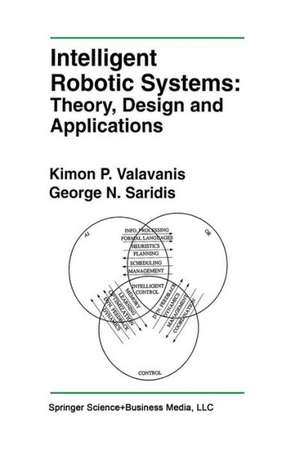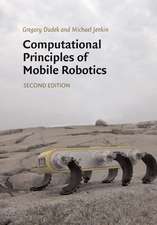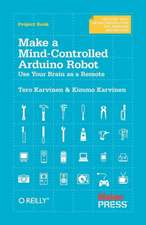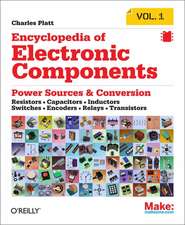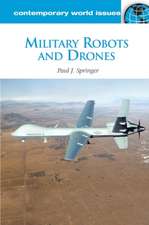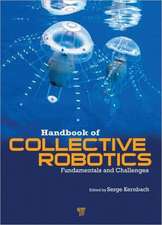Intelligent Robotic Systems: Theory, Design and Applications: The Springer International Series in Engineering and Computer Science, cartea 182
Autor Kimon P. Valavanis, George N. Saridisen Limba Engleză Paperback – 5 noi 2012
The theory of intelligent machines involves utilization and integration of concepts and ideas from the diverse disciplines of science, engineering and mathematics, and fields like artificial intelligence, system theory and operations research. The main focus and motivation is to bridge the gap between diverse disciplines involved and bring under a common cover several generic methodologies pertaining to what has been defined as machine intelligence. Intelligent robotic systems are a specific application of intelligent machines. They are complex computer controlled robotic systems equipped with a diverse set of visual and non visual sensors and possess decision making and problem solving capabilities within their domain of operation. Their modeling and control is accomplished via analytical and heuristic methodologies and techniques pertaining to generalized system theory and artificial intelligence.
Intelligent Robotic Systems: Theory, Design and Applications, presents and justifies the fundamental concepts and ideas associated with the modeling and analysis of intelligent robotic systems.
Appropriate for researchers and engineers in the general area of robotics and automation, Intelligent Robotic Systems is both a solid reference as well as a text for a graduate level course in intelligent robotics/machines.
| Toate formatele și edițiile | Preț | Express |
|---|---|---|
| Paperback (1) | 943.57 lei 6-8 săpt. | |
| Springer Us – 5 noi 2012 | 943.57 lei 6-8 săpt. | |
| Hardback (1) | 950.21 lei 6-8 săpt. | |
| Springer Us – 30 iun 1992 | 950.21 lei 6-8 săpt. |
Din seria The Springer International Series in Engineering and Computer Science
- 24%
 Preț: 1041.98 lei
Preț: 1041.98 lei - 20%
 Preț: 643.50 lei
Preț: 643.50 lei - 18%
 Preț: 1225.62 lei
Preț: 1225.62 lei - 18%
 Preț: 965.02 lei
Preț: 965.02 lei - 20%
 Preț: 646.12 lei
Preț: 646.12 lei - 18%
 Preț: 948.79 lei
Preț: 948.79 lei - 20%
 Preț: 646.62 lei
Preț: 646.62 lei - 15%
 Preț: 637.46 lei
Preț: 637.46 lei - 20%
 Preț: 643.83 lei
Preț: 643.83 lei - 18%
 Preț: 949.23 lei
Preț: 949.23 lei - 20%
 Preț: 644.48 lei
Preț: 644.48 lei - 20%
 Preț: 994.92 lei
Preț: 994.92 lei - 20%
 Preț: 645.97 lei
Preț: 645.97 lei - 18%
 Preț: 946.87 lei
Preț: 946.87 lei - 20%
 Preț: 995.57 lei
Preț: 995.57 lei - 18%
 Preț: 956.99 lei
Preț: 956.99 lei - 20%
 Preț: 644.98 lei
Preț: 644.98 lei - 15%
 Preț: 649.54 lei
Preț: 649.54 lei - 18%
 Preț: 950.21 lei
Preț: 950.21 lei - 18%
 Preț: 1221.38 lei
Preț: 1221.38 lei - 18%
 Preț: 957.62 lei
Preț: 957.62 lei - 15%
 Preț: 643.99 lei
Preț: 643.99 lei - 18%
 Preț: 948.47 lei
Preț: 948.47 lei - 18%
 Preț: 947.35 lei
Preț: 947.35 lei - 20%
 Preț: 1284.65 lei
Preț: 1284.65 lei - 20%
 Preț: 1628.31 lei
Preț: 1628.31 lei - 20%
 Preț: 1285.78 lei
Preț: 1285.78 lei
Preț: 943.57 lei
Preț vechi: 1150.70 lei
-18% Nou
Puncte Express: 1415
Preț estimativ în valută:
180.61€ • 196.25$ • 151.81£
180.61€ • 196.25$ • 151.81£
Carte tipărită la comandă
Livrare economică 21 aprilie-05 mai
Preluare comenzi: 021 569.72.76
Specificații
ISBN-13: 9781461365853
ISBN-10: 1461365856
Pagini: 276
Ilustrații: XX, 252 p.
Dimensiuni: 155 x 235 x 14 mm
Greutate: 0.39 kg
Ediția:Softcover reprint of the original 1st ed. 1992
Editura: Springer Us
Colecția Springer
Seria The Springer International Series in Engineering and Computer Science
Locul publicării:New York, NY, United States
ISBN-10: 1461365856
Pagini: 276
Ilustrații: XX, 252 p.
Dimensiuni: 155 x 235 x 14 mm
Greutate: 0.39 kg
Ediția:Softcover reprint of the original 1st ed. 1992
Editura: Springer Us
Colecția Springer
Seria The Springer International Series in Engineering and Computer Science
Locul publicării:New York, NY, United States
Public țintă
ResearchCuprins
1 Introduction.- Section 1 Introduction.- Section 2 Outline of the Monograph.- 2 A Review on Hierarchical and Expert Systems.- Section 1 Introduction.- Section 2 Information Theory as Applied to General Systems Theory and Modeling of Decision Makers.- Section 3 The Duality of the Concept of Entropy and its Application to Control Theory.- Section 4 Hierarchically Intelligent Systems.- Section 5 Knowledge Based Expert Systems.- Section 6 Comparison Between Knowledge Based Expert Systems and Intelligent Machines.- Section 7 Remarks.- 3 On the General Theory of Intelligent Machines.- Section 1 Introduction.- Section 2 Review of the Analytic Formulation of Intelligent Controls.- Section 3 Definitions and the Principle of Increasing Precision with Decreasing Intelligence.- Section 4 The Analytic Formulation of the Principle of Increasing Precision with Decreasing Intelligence.- Section 5 The Analytic Structure of an Intelligent Machine.- Section 6 Intelligent Machines in a Distributed Intelligence Environment.- Section 7 Applications to Robotic Systems.- Section 8 Remarks.- 4 The Mathematical Model for Intelligent Robotic Systems.- Section 1 Introduction.- Section 2 The Probabilistic Model of the Organization Level.- Section 3 The Expert System Cell for the Organization Level.- Section 4 The Coordination Level.- Section 5 The Execution Level.- Section 6 Summary of the Mathematical Model.- Section 7 Integrated Control and Diagnostics in Intelligent Robotic Systems.- Section 8 Discussion.- Section 9 Remarks.- 5 Architectural Models for Ntelligent Robotic Systems.- Section 1 Introduction.- Section 2 The Architectural Model for the Organization Level.- Section 3 The Architectural Model for the Coordination Level.- Section 4 The Architectural Model for the Execution Level.- Section 5 The Architectural Model for the Upgrade Phase.- Section 6 Remarks.- 6 Examples and Case Studies.- Section 1 Introduction.- Section 2 An Intelligent Robot Operating System for Emergency Situations In A Nuclear Power Plant.- Section 3 An Intelligent Robotic System Operating in a Hospital Environment.- Section 4 A Robotic Assembly System.- Section 5 Remarks.- 7 Conclusions and Recommendations.- Section 1 Summary.- Section 2 Present and Future Developments in Intelligent Controls.- Section 3 Some Ideas for Future Investigation.- Appendix A References.- Appendix B Glossary.- Appendix C Abbreviations.
